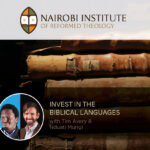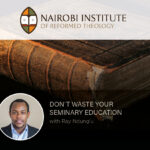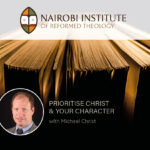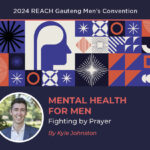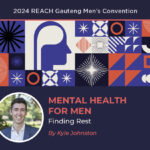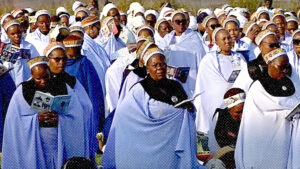Excellent Reformed and Evangelical conferences are held across Africa every year. The TGC Africa Podcast showcases select conferences to encourage and build up the local church across our continent.
This sermon is one of 3 delivered at the 2024 Township Reformation Conference hosted at Rosebank Union Church, Johannesburg, South Africa.
How can you truly know yourself? The Biblical Gospel says that you cannot know or understand yourself rightly until you know God. In fact, humanity, created in the image of God, can only truly understand ourselves by understanding that we worship a God who knows all. He knows all about us: the good, the bad and the ugly. And yet, he loves us perfectly. Because of His great love, we have the great beauty of the Gospel.
Understanding yourself comes from understanding that you worship a God who knows all of you.
In this talk, Sihle Xulu addresses a version of the Gospel which is really no Gospel at all. Instead of being good news for us, it cruelly brings us into more bondage. It offers us a false hope and puts self at the centre. It tells us that if we could just do more, be more, we could help ourselves.
As Pastor Xulu says, “This gospel comes in, it talks about self-esteem instead of self-denial. It talks about pursuit of happiness instead of pursuit of holiness – this gospel of self-help.” In stark comparison to this, we can turn to Jesus, our real hope for unconditional love. We can also enjoy the ultimate freedom of knowing that it’s not all about us, it is about Him.
Other Content On This Topic
The Distorting Power of the Prosperity Gospel
What Is the Gospel? // Veracity Fount
The Only True Foundation for Human Identity and Worth
Omniscience: There’s Nothing God Doesn’t Know
Date: 9 August 2024
Location: Together for Ivangeli 2024 Township Reformation Conference: Counterfeit Gospels and the Glorious Gospel of Grace, Rosebank Union Church, Johannesburg, South Africa
Transcript
Welcome
Amen and amen. Thank you, Pastor. It’s been a good day today, amen? It’s so good to be with you. It’s so good to be in this conference. I just want to mention our organizers. Can we just give them a hand, our pastors, who have done such good work?
I think Pastor Sbu did say that I can mention that it was, I think, 12/13 years ago when we did the first Township Reformation Conference in Tembisa and it was through the burden of seeing healthy churches being planted in the township, healthy Biblical teaching being a norm in the township, expository preaching being a norm in the township – 13 years ago.
And there was a sense that the dream, that burden almost died down, but it is such a joy for me to be here this morning to see what God has done. That the Lord has answered prayers that have been prayed years and years ago. And for us to gather this morning this way; it’s an emotional thing, even as I think about it.
Many brothers who were there who are still here today. It’s just good to see old faces and new faces. So we give, just give praise to the Lord for everything that he has done for us, to be here churches, different churches.
Father, we thank you for your kindness to us. Thank you Lord, that it is not by might, it is not by power, but it’s through the Spirit of the living God. You are the one who has seen this through. You are the one who continues to see this through.
With so many issues, so many things that are on the way, even as we thought about this morning, including financial issues, that Lord, you’ve been kind. You’ve been good. And Lord we pray that there will be many more years of this work to continue. We pray for more fruit. We pray for more churches to be planted. We pray for more churches being healthy, growing, young men being raised up to preach and proclaim the gospel of the Lord Jesus Christ.
So we come this morning, humbled, in awe of your goodness. We pray now as you open up your Word, Lord, may you speak to us. What we do not know, may you teach us. What we have not, may you give us. What we are not, may you make us. Pray all of these things in Jesus name, Amen. Amen.
The Self-Help Therapeutic Gospel
My assignment on this session is to talk about what has been termed the self-help therapeutic gospel. The self-help therapeutic gospel versus the real gospel of grace.
One author, Theologian Carl Truman, in his recent book, has termed this that, “We are now living in a therapeutic age.” We are now living in a therapeutic age. Everything is about believing in yourself, discovering yourself, self-love, loving yourself. Some of you are familiar with those things. These are the waters we are swimming in. Forgiving yourself. The therapeutic age.
He continues to say that, “The message of this therapeutic age is all about self.” It’s all about self: self-discovery, self-care, self-determination. I’m already in other people’s living rooms because we know this. Self-love, just forgive yourself, self-determination, self-actualization, be the better you, the better version of yourself, be true to yourself. If you do anything, be true to yourself.
And actually, what is sin now in this gospel? It’s just when you have bad feelings about yourself – that’s wrong. Be happy: that’s the ultimate value about this gospel. True potential, true happiness – that’s the message that’s been preached today through what Carl Trueman calls this “therapeutic age.”
And the truth about this gospel, this self-help gospel, why it is so appealing to many of us, is that it comes to places where we are needy the most, where we are most needy, where we are doubting ourselves. “Do I bring any contribution to this world? Is there any meaning about my life? I don’t think I contribute anything.” What they call “impostor syndrome.” Do I have anything to contribute? Self-doubt.
And this gospel comes in, it talks about self-esteem instead of self-denial. It talks about pursuit of happiness instead of pursuit of holiness – this gospel of self-help.
Now here’s the thing about the false gospels, which is talking about today. Pastor Mvusi spoke about syncretism. Most of these false gospels, they look at our longings, at our needs and they give an alternative answer to them.
Pastor, as he was speaking about syncretism, syncretism speaks to us spiritually. As humanity, we were made to be in relationship with God. Deep in our longings, we have that, even with someone who must suppress that. But at the end of the day, we all have a need to have a relationship with God. And therefore, even syncretism or these false gospels, specifically syncretism, will come and say, “There are other mediators between you and God, because we know you need the connection between God, but are going to give you another alternative.” It comes and speaks to your spiritual need.
Pastor Nguni is going to come and speak about the Prosperity Gospel. This prosperity gospel itself comes to speak to our physical needs. We need money, we need good health, we need shelter, we need food. And because of this, this gospel comes and gives us another version of God and it says to us the main objective about God is that he wants to give you these physical needs. That’s the main objective about your relationship with God. He wants to give you everything you want physically.
First one was on spiritual terms: we know we need a relationship with God; we’re going to offer you an alternative. This one says: we know you need physical needs, your physical needs; God is just there so that you can knock and he will give you whatever you want.
But then what we are talking about now, this self-help therapeutic gospel, it goes for what is called our psychological needs.
What are our psychological needs? These are our needs to feel loved, to feel valued, to have significance, to have meaning. These are things some of us don’t even know we need but we need them. These are our longings psychologically.
Self, what is called self-esteem, confidence, significance, self-development. It comes and it gives us a different version of the gospel of the Scriptures because it knows we need those things. They are innate in us. It says, “You can become a better you. Your best life now.”
And what happens in the self-help gospel, Jesus just becomes your coach to help you reach your full potential. Jesus is just there to pat you on the back for a better you, whatever that “better you” is. That’s what this self-help therapeutic gospel is all about.
Now as I’m going to be talking about this gospel, you will see that again I’ve mentioned that it’s all about self. It is me at the center of it. It doesn’t glorify God. It seeks to glorify itself: self-discovery, self-love, self-development. This gospel is obsessed with self. It is an unhealthy obsession with self. It is self absorbed.
How to Know Yourself
Now the question is, if there is an unhealthy way of thinking about self in a self-absorption sense, is there a healthy biblical way to understand self? Is there a good and a biblical way to have self-awareness? Now the Scriptures in the Bible, the answer to that is yes, there is a biblical way, there is a good way to understand that.
The Bible and the Christian tradition would say yes, it’s good to know yourself, good to know who you are as a person, it’s good to be self-aware, not for the purposes of self-inflation but for the purposes of transformation, sanctification, but it’s good to know yourself.
In fact, the reformer Calvin in his book Institutes of Religion, he says at the beginning of the Institutes, he says these words: “Nearly the whole of sacred doctrine, nearly the whole of understanding Christian doctrine is the understanding of knowledge of God and the knowledge of ourselves.” Nearly the whole of sacred doctrine consists of these two parts: knowledge of God and the knowledge of ourselves.
It is good for us to understand ourselves as long as we understand ourselves in relation to God, because wrong ideas about God will lead us to wrong ideas about ourselves. Wrong ideas about God will give us wrong ideas about self. So we need to be people who are interested, honestly, to know about ourselves so that we can bring our whole selves in submission to God and his Word.
So that we don’t have two identities, if I can put it that way: the true self and the false self. Because I can say this, brothers: if we don’t understand this, and I’ve seen this in so many of our Evangelical churches, where people don’t bring their whole selves to God. They live pretentious lives. There’s a self that is there that comes to church Sunday morning, there’s another self behind doors. You have not submitted your full self under the living God.
And therefore, we need to understand ourselves.
So, how do we do that? How do we healthy examine ourselves in a Biblical framework that is not the self-help therapeutic gospel? How do we do that?
And I believe this Psalm, Psalm 139, is really helpful for that. This Psalm, Psalm 139, is a Psalm that is talking about a person in relation to God. It is talking about self-awareness but it is rooted in God. This is a Psalm that is mainly talking about God who is omniscient, God who is all knowing.
I mean, you will look at the Psalm, the words “know” are all over the Psalm. “Oh Lord, you have searched me and you have known me. You know when I sit down. You know when I rise up. Before the word is on my tongue, behold oh Lord, you know it all together.” (Psalm 139
This theme of God’s knowledge is all over this Psalm. The God of all knowledge. And here’s what I want us to see from the Psalm: first, we’re going to see the God of all knowledge but also that we’re going to look at ourselves. Firstly, I want to see with ourselves that we need to understand or know our being made in the image of God, our image of godness. This is the word I’m just using today. Our image of godness, that we image bearers of God. We need to understand that. The Psalm is going to show us that but also we need to understand our sinfulness. And then thirdly, we need to understand our belovedness from God.
We need to understand our image of godness, our sinfulness and then our belovedness from God. But first, let’s look at this God of all knowledge.
The God of All Knowledge
The Psalm says, “Lord, you have searched me. Oh Lord, you have searched me and know me. You know when I sit down and when I rise up. You discern my thoughts from afar. You search out my path and my lying down and are acquainted with all my ways. Before a word is on my tongue, behold oh Lord, you know it all together. You hem me in behind and before and lay your hand upon me. Such knowledge is too wonderful for me. It is high. I cannot attain it.” (Psalm 139:1-6)
The psalmist is saying, “Lord, you know me.” He’s giving us this theology of the God of all knowledge, the God who is omniscient – everything he knows. God knows everything known, everything unknown and everything knowable. He knows it all together. He knows everything.
He possesses complete, divine, universal knowledge. He knows the past, the present and the future at the same time, at the same time. He’s an eternal God who knows all things – total knowledge, immediate knowledge, future knowledge. He knows it all perfectly, completely.
This almost talks about this, the transcendence of God. That’s why the psalmist is saying, “I can’t attain this. It is too high for me. It is too transcendent. I can’t grasp it.” It is outside human grasp.
But at the same time, the psalmist just doesn’t want to say for us to give up and say this is too lofty for us. He comes closely and says, “This God who knows all things, knows me, knows me. You don’t just know everything – it’s not just an abstract thing – but Lord, you know me. You know everything about me. You know my thoughts, my words, my activities, my motives, even the word before I speak it, you know it. You discern my thoughts.”
Sometimes we say this, but we’re thinking this. God knows it all – our thoughts, everything. We are laid bare before him, laid bare before him. I don’t know whether that’s comforting or that’s scary for some of us, that God knows us. He’s an all knowing God. And there is a sense that should give a sense of fear, but also it should bring comfort. He doesn’t know just our activities and motives – he knows our hearts, he knows our deep longings, he knows our sorrows, he knows our frailties, he knows our cries, he knows us.
The God of all knowledge – he’s the God of all knowledge.
And out of the vision of understanding this God of all knowledge, that can flow to the vision of understanding myself. I don’t have to pretend with him. He knows it all. I don’t have to bring another people, this person, other people. Who am I playing games with? God knows it all and I can be honest.
And what’s interesting with this Psalm, David, what he’s doing here, we’ll see towards the end of the Psalm, he’s asking God towards the end, “Lord, may you search me. Search me, oh God and know my heart. Try me and know my thoughts…” (Psalm 139:23)
And by the way, because of the nature of this sort of a topical sermon, I’m sort of going to be everywhere in the Psalm. I’m not going to be going through it in an expositional way. But he’s saying, “Search me, oh God, and know my heart. Try me and know my thoughts.” He’s saying, “I know you know me, God, but may you help me know myself. I know you know me, but may you help me know me.”
Because sometimes there’s a sense that we don’t even know ourselves, ourselves. Some of us will be like, “How did I do that? Why did I? Why did I think that?” Have you had a thought where it’s just like, “Why did I think that? Who am I?” Lord, help me know me.
And that’s the key difference between this self-help, self-discovery thing and the biblical self-awareness. The biblical awareness of yourself is rooted in God’s knowledge of me. I’m not discovering myself out of nowhere, out of a vacuum. You know, some people will say, “I need a trip to Madagascar or to Mauritius just to discover myself.”
No, here’s the Scriptures: God knows you. Understanding yourself comes from understanding that you worship a God who knows all of you. If you want to know yourself, know him, know him.
Without – that’s what Calvin was saying – without the knowledge of God, there can’t be knowledge of self. Know him.
So here’s the God first that we need to root our self awareness on. That God is the God of all knowledge. He knows us .
Our Image of Godness
But secondly, let’s look at ourselves. Let’s know our image of godness. Look with me in verse 13. He says there in verse 13, “For you formed me, you formed my inward parts. You knitted me together in my mother’s womb. I praise you for I am fearfully and wonderfully made. Wonderful are your works, my soul knows it very well.” (Psalm 139:13-14)
Now this is a verse that is on the cups and teacups and everywhere. “I’m wonderfully and fearfully made.” Now I need to say this: that this is where in some places this self-help therapeutic gospel sometimes gets it right. You know we have common grace. Common grace means that there are people that are not even Christians who get certain things right. So even this therapeutic gospel, in some places, it would get certain things right, because this therapeutic gospel does focus on our value as people; that you have value, you have dignity which sometimes even our churches, this is where we miss it.
And this gospel comes in and overtakes us because we actually move away from preaching about humanity the way the Scriptures talks about humanity. The Scriptures doesn’t talk about humanity from Genesis 3. Amen somebody? It doesn’t start from Genesis 3. The Scripture starts from Genesis 1. You were made in the image of God and God says this is good.
Therefore, you have value, you have dignity in and of yourself. We are in Genesis 1 and 2. This is Bible. And Genesis 3 comes in with the fall of man and now our image of godness have been marred with sin. But we still have the image of God. We still have value. Every human being has value and dignity because they were made in the image of God. And therefore, we need to understand this image of godness. That’s what the psalmist is saying here.
“I am fearfully and wonderfully made. I praise you because of that. You formed my inward parts. You knitted me.” And self awareness or self examination, a biblical one, firstly understands that I can celebrate that I’m made in the image of God, God has given me value. I’m not who whoever says that I am.
And sometimes these gospels comes in and tell people things that we know. The Scriptures teach us that: that people are made in the image of God and therefore they have value and dignity. That’s why all of these “isms:” racisms, sexism – these are just anti-gospel, because we understand Genesis 1. Everybody is the image of God, is made the image of God. We know our image of godness that includes the uniqueness of our humanity.
Who you are is an image bearer of God. Your personality, the way you relate to God, the way, the way you are, you’ve been formed and knitted by God.
I’m going to get to the sinfulness part but I need us to understand that part also. We are made in the image of God. And there’s a healthy way of understanding that, who we are as humanity – people who are fearfully and wonderfully made – that is a Biblical teaching. Everything, who we are and everything about us is a work of God. It’s a work of God. This is part of us understanding ourselves.
Our Sinfulness
Secondly, we firstly understand our godness, being made in the image of God, but secondly, we need to understand our sinfulness, our darkness. Which is why the psalmist here as soon as he understands that God is everywhere, knows everything, he seems like, “I want to flee from God.” From verse here, we have in verse 7, “Where shall I go from your Spirit? Or where shall I flee from your presence?” (Psalm 139:7)
We see this again and again in the Scriptures: when man has a sense of the presence of God, they want to flee away from God. “I can’t stand the presence of God because of who I am, because of sinfulness. That now has become…I’m now… I have inherited from Adam. Where can I flee? Where can I go?”
Now again, this is where the self-help therapeutic gospel does not dare to go. It doesn’t go to your sin. It just says you have value, you are great, you just need to become a better you.
It does, it skips Genesis 3. It just goes all over that. Now David here acknowledges that the Lord knows him better than he does and the Lord knows his darkness and sinfulness even better than he does. He says, “Lord, search me. If there’s any way offensive, any way grievous to you, any way in me that is sinful, I need to see it all because you see it all.”
I know some of us, you know, when we talk about sinfulness that we are sinful and I know, I mean, some of us come from reformed churches. We understand depravity of man, but actually, we don’t understand it. That we are actually sinful more than we think we are.
One pastor says, “You are more sinful than you could ever dare imagine.” I think for some of us pastors we, sometimes we get this because we deal with people. Sometimes, it’s just like, “Brother, what am I hearing? Come now! How?” But – sin, sin.
And this so important even when we need to extend grace to people, because we underestimate sin. We think sin is just being caught in a cookie jar with something. Sin is deep. And then, when we extend grace to people, we extend grace for just “good sins.” We don’t extend grace to people because we don’t understand sin and the sinfulness of sin.
David here says, “Search me, search me that I may know. Help me to know me so that I may not understand, I may not mis, sort of, misunderstand or underestimate my sinfulness.”
Know your darkness. Know your sinfulness.
It says, “Where shall I go? If I ascend to Heaven, you are there. If I make my bed in sheol, in the grave, you are there. If I take my wings in the morning and dwell in the uttermost parts, you are there. Even in the darkness, darkness is not dark to you. When you come in, lights come in the darkness.” (See Psalm 139:7-12)
I don’t know if you’ve ever been in the dark place where you can’t see clearly. You know, you were maybe in the place, you didn’t see there were cockroaches or there were rats or whatever. You are just and then someone comes with the light. And I’m sitting in this dirty place.
Sometimes we don’t understand the darkness of our soul and the darkness of our sin. We need God to come and shine the light. Lord, I thought it was bad and it’s this bad. Search me.
And the therapeutic gospel, this self-help gospel says, “Cut out anything that will make you feel bad about sin. If it says you are there’s something off with you, there’s something wrong with you, cut them off!”
And the Scriptures are clear: we are created in the image of God but because of sin, now this sinful nature is within us, something is wrong with us – everybody. I don’t have to convince you, you know something is wrong with you. And Paul says that in Romans 7, “The things I want to do, I find myself not doing. The things that I do, the things I don’t want to do. Who will deliver me from this body?” (Romans 7:15-20)
And then the self- therapeutic gospel says, “Any negativity, cut it off!” Some of you have, some of you have somehow embraced that, ‘Negative energy, cut it off!” You know, save it. We don’t want to be corrected. You don’t want someone who’s going to say, “You know what, have you actually seen this? Pray to the Lord. He may show you. Repent. Repent.”
But now we have been so acquainted with this gospel, if the church preaches about sin, “Uhuh, I need somewhere else. I need victory in my life.”
Know your darkness, know your sinfulness. Not for the sake of wallowing in sin, for the sake of transformation, for the sake of sanctification. “Lord, you know me all together: my thoughts, my motives. You know my ins and outs, where my eyes have been, where my feet have been.” This is what David is saying.
You know it all: what I’ve said, what I was thinking of saying, you know it all. You know where my eyes have been, you know what I’ve typed, these days, you know what I’ve typed on my phone. You know it all. You’re acquainted with my sin. Help me to be acquainted with my sin so that you may lead me to the way everlasting so that I can repent and be sanctified. Help me to know me.
And the truth is, our culture today no longer talks about sin, no longer discusses sin, no longer – sin is almost like a word that is coming out of the vocab, because of this gospel, this therapeutic age we live in. And unfortunately, the church is following suit, taking sin out of the vocab. You’ve removed sin, even us as Christians. Now, sin is just a mistake. Sin is just an error. Sin is just a disorder. Sin is just an addiction. In other, in other circles, sin is just a spirit.
You know, there was a friend of mine who came to me and said, “These days, I’m having a big battle with a spirit of fornication.” Not a spirit of sin.
And the thing is, if we wrongly diagnose ourselves, we will wrongly diagnose the solution. If we put vocab, sin out of vocab, then what are we doing with the gospel because the gospel comes in and answers this dilemma we are in.
One author, Fleming Rutledge says, “We are responsible before God for sin and yet we are unable to liberate ourselves from its grip. We are in a desperate situation: deserving of God’s wrath and marked out for his judgment, each of us individually and us collectively. It is only by endeavoring to look sin straight in the face that we are able to understand grace. Sentimental evasions are long range cruelties.”
Do you hear what the author is saying here? Sentimental evasions. If we evade sin we are being cruel to people. We need to look sin straight in the face for us to understand grace. And he says here, we are unable – it’s almost like this author is talking about what he’s talking about in what is talked about in Ephesians 2, that we were children of wrath. We were dead in our trespasses. (See Ephesians 2:1-10)
There was no way out. Self-help gospel would not help us because we are unable to help ourselves. It cannot help us. It cannot help us in this dilemma. If it says, “You can help yourself – just three ways to do this.” It doesn’t work with our nature. We can’t help ourselves out of this. That’s the nature of sin, the grip, it holds us, we’re enslaved to it.
The trouble we are in is a trouble that we can’t get ourselves out of. We need someone, out, from out there, who’s going to come and help us. Self-help therapeutic gospel is not going to help us, it’s going to be cruel to us because he’s going to say to us, “You can do this yourself. Buckle up! Buckle up with your bootstraps. You can do this.” That’s the message out there, saying we can do this.
But the gospel speaks in a different way. It says, “Help comes when you realize I can’t help myself.” That’s the beginning of healing. That’s the beginning of being in the grip of what God is doing in the gospel.
If original sin is true, if you and me and every human being on earth is conceived, born in the bondage of sin, death and the evil one, we can’t help our way out of this. We are in this spiritual slavery of sin. And pretending that we are not is cruel. It’s cruel to say the least. And that’s the danger of self-help gospel, because it minimizes sin. “It’s not that much of an issue. In fact, take it away! You just… it’s all of these bad feelings, this religion with all of this. No, you’re not that bad.”
Know your condition. Sin is part of our condition now and we cannot understand ourselves without it. If we cut it out, we lose the ability to understand ourselves and we lose the ability to be helped by God.
That’s why we are not standing in awe of the gospel, because we have minimized sin. “Search me, oh God. See if there’s any wicked way in me and lead me to the way everlasting.” (Psalm 139:23-24)
Our Belovedness
So, know the image of godness in you. Know the sinfulness in you. But lastly, know the belovedness from God. What’s interesting about this text, it says, “Lord, where shall I go from your Spirit or where shall I flee from your presence? If I ascend to Heaven, you are there. If I make my bed in sheol, you are there. If I take my wings in the morning and dwell in the uttermost part of the sea, even there your hand shall lead me, and your right hand shall hold me.” (Psalm 139:7-10)
So now the psalmist is changing. “I’m running away but wherever I go, you are there. Not in a bad way, you are there to hold me, to lead me. You are there to hold me, to lead me. Even in the darkness, you will not abandon me. That’s how deep you love me, how deep you have pursued me. Even in my darkness, your hand is there. Even in the grave, you will take me through the grave. Even in sheol, you will never abandon me because you know me. At the same time, you pursue me, you love me.”
Now this is where the gospel comes in a different way. This is the beauty of the gospel because, friends, our deepest longing, the deepest longing of the human heart, is to be known and to be loved unconditionally. That’s what we all want. We long to be known, we long for someone to know us, to know everything about us and love us anyway.
Some of us, the reason why we even pretend is because we think if people really knew us they wouldn’t love us. And therefore, I’m going to give a person a different version of me, so that they can love me. Because at the end of the day, your deepest longing is to be known fully and to be loved fully at the same time. And this Psalm is giving us that. This Psalm is giving us a God who knows us from the bottom but loves us to the sky. Knows the deepest parts but loves you more than the people who don’t even know your deepest parts.
To be truly known and to be fully loved. And this psalmist is saying, “Lord, you’ve known me. Wherever I go, you pursue me but your hand holds me. Your hand is with me.”
And that’s what we all need. That’s what the self-help gospel will not give us. It won’t give us any person or any God who will fully know us and truly love us. And in the gospel we have that; that God in his love that even while we were weak, while we were yet sinners, Christ died for us. He did not wait for you to clean up. He loved you in your darkest moments. The gospel is for those who have come to the end of themselves. “If people only knew these dark parts of me…”
This is where I really need the gospel: be fully known and to be truly loved. And the gospel gives me that, the Lord Jesus Christ, who goes with me to the abyss, who goes with me to the grave, and comes out and says, “This is, this is my son.” Where will you find that? Where will you find that gospel?
The God who knows you fully, the God of all knowledge is the God who truly loves you – who has demonstrated that love in the person and the work of the Lord Jesus Christ, the one who has come down to live the life we should have lived fully obedient to the law, fully obedient to the Father. He lived that life. But instead of getting the blessings of living a fully obedient life, he gets the curse of living the sinful life that I lived. “Cursed is the one who was hung on the tree.” (Galatians 3:13)
He gets my curse and the punishment – the wrath of God – the due punishment of sin that I deserved, falls on the sinless one. He dies the death that I should have died. He dies, he does not faint, he dies, he does not faint, he dies. The death of Christ – sometimes we just pass through that. The death of Christ means something. He dies. And on the third day, he rose from the dead. Romans says he rose for our justification. He rose so that we may be made right with God, fully set, full satisfaction.
Nothing punitive can come my way because all the punishment had fallen on Christ. Can I say that again? Nothing punitive can now come my way because all the punishment I deserve has fallen on Christ. Some of us live lives where things go wrong and we say, “Oh God is punishing me.” Nothing punitive can come my way because all the punishment fell on Christ. The beauty of the Gospel.
Know the God of all knowledge, know your image of godness, that you have value, you have dignity because you’ve been made in the image of God, fearfully and wonderfully made. But also know that there’s something wrong until the Lord Jesus comes there’ll always be something off. And we continue to plod on and through the Spirit to kill sin. You also know you were beloved. The God who knows you is the God who holds your hand, is the God who has loved you with an everlasting love, who’s leading you to the way everlasting.
Consider the Gospel
You could be here this morning, you just came for the fun of it. We’re in Rosebank, we’re in Sandton. But you know you don’t know this gospel, this gospel of Christ. You’re still living in pretense. Church is just church, something we do on Sunday. Friends, we are talking about eternal matters. The God who knows you but the God also who loves you.
Would you surrender your life to him this morning? It’s not by accident you are here, it’s the providence of God. God has placed you here this morning for you to hear the gospel. Today could be the day of your salvation. Won’t that be wonderful? The start of a new life, start of a new life in Christ. Today could be your day of your salvation.
Friends, we can have significance, we can have self- knowledge, not from the self-help but by understanding that God of all knowledge, who has loved us with an everlasting love in the person and the work of Christ. Let’s pray together.
Heavenly Father, we thank you so much for your love for us. Indeed, you are a good, good Father. You are a God of grace and love. You know us. You know all our lives. You know us.
You know our motives, know we lie down, you know when we rise up. You know our sorrows, you know our deepest needs and our deepest need is found in the person of Christ.
Thank you for your son, our saviour. May you make him real in our lives. May you take what is abstract, what is just knowledge, what is just belief, may you make it real in our lives by the power of the Holy Spirit. I pray for our friends who are here who don’t know you. Lord, you are able, mighty to save. Would you save this morning? We pray this in Jesus’ name, so strengthen us, be with us, encourage us in the gospel. We pray all of these things in the name of the Father, the Son and the Holy Spirit. And everybody said, amen and amen. Amen and amen.
Sihle Xulu is a church planter and pastor at Renewal Fellowship in Johannesburg. He is married to Lethabo and they have three kids. He is also a long suffering Arsenal fan.


